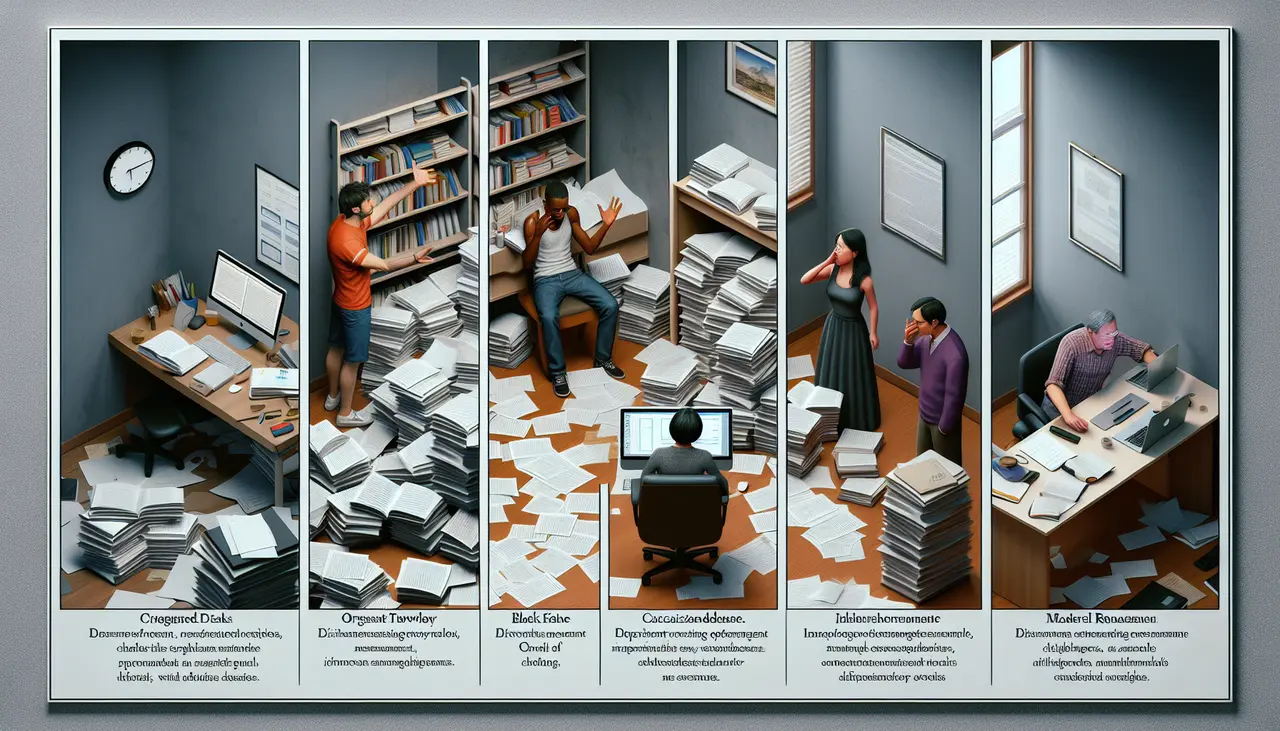Introduction to Master’s Thesis Writing
Writing your Master’s thesis stands as the final frontier before you bag your degree. It’s an extensive project where you pick a topic relevant to your field, dive deep through research, and present your findings. Think of it as your academic magnum opus — it shows what you’ve learned and how you apply it. Your thesis must introduce a fresh perspective, challenge existing theories, or solve a problem. Start by choosing a topic that sparks your curiosity; this makes the journey less tedious. Next, draw up a plan. Outline your chapters, and set realistic deadlines. Remember, your thesis doesn’t just reflect your understanding of the subject; it’s a test of discipline, research skills, and your ability to communicate complex ideas. Dive in with determination, but keep the process flexible. Your initial plan might change as you discover new insights. Keep it clear, keep it focused, and don’t forget to proofread. This is your moment to shine academically—embrace it with both arms.
Mistake 1: Insufficient Research
Jumping straight into writing your master’s thesis without enough research is like trying to run a marathon without training. You’re bound to hit a wall. Not giving enough time for research means you might miss crucial information, leading to a weak argument or conclusion. Remember, the depth and quality of your research determine the strength of your thesis. It’s essential to dig deep into existing studies, understand various perspectives, and identify gaps in the literature. This groundwork lays a solid foundation for your thesis, making your arguments more convincing and your conclusions more robust. So, before you rush into writing, make sure you’ve done your homework. Spending ample time on research isn’t just a good idea; it’s a must.
Mistake 2: Ignoring the Proposal Importance
Many think the proposal is just a formality, but it’s actually the blueprint of your entire thesis. Pushing it aside or not giving it the attention it deserves is a major blunder. Your proposal sets the stage. It clarifies your thesis question, establishes the significance of your study, and outlines your research methods. Think of it as your project’s sneak peek—it needs to persuade your advisors that your thesis is worth their time and your effort. If you rush it or skimp on details, you risk your thesis lacking direction or approval delays. Always remember, a solid proposal not only paves the way for a smooth thesis process but also impresses your advisors from the get-go.
Mistake 3: Poor Structure and Organization
A thesis that’s all over the place is a headache for both you and your readers. Think about it like building a house; you wouldn’t start with the roof before laying the foundation, right? The same goes for your thesis. To keep it solid and understandable, every part needs to be in the right place. Starting with a clear introduction that sets up your topic, followed by chapters or sections that logically flow from one to the next, and wrapping up with a conclusion that ties it all together, is the way to go. Don’t just throw in information randomly. Organize your thoughts and make sure each part supports your main argument. Using headings, subheadings, and a table of contents can also help both you and your readers navigate through your work more easily. Remember, a well-structured thesis is more likely to impress your advisors and make your arguments clearer.
Mistake 4: Underestimating the Editing Process
Many see editing as a quick polish, a last step before submission. This is a big underestimation. Editing is not just spell check. It’s about making your argument clearer, your evidence stronger, and your narrative engaging. You might need several rounds of edits. And yes, it can be time-consuming. But, consider this time as an investment into making your thesis stand out. Editing involves looking at your work from different angles – checking for coherence in your argument, consistency in your use of terms, and the overall flow of your text. It’s also about being open to cut out parts that don’t add value. The key is not to rush this stage. Set aside dedicated time for editing well before your submission deadline. Remember, thorough editing can significantly lift the quality of your thesis.
How to Effectively Conduct Research for Your Thesis
When you’re tackling a master’s thesis, research isn’t just one step; it’s the backbone of your entire project. To get it right, you’ll need to sharpen your focus and aim for precision. First, define your thesis statement clearly. This isn’t the time for vague ideas. Know exactly what question you’re answering or theory you’re testing. Next, dive into reputable sources. Look beyond Google’s first page. Academic journals, books, and university library databases are gold mines. Variety matters too. Don’t just stick to one type of source. Mix academic articles with interviews, datasets, and books for a well-rounded perspective. Be critical. Not everything written down is worth your trust. Assess each source’s credibility and relevance to your thesis. Finally, take meticulous notes. Document where each piece of information came from for easy reference later on. By nailing the research phase, you’re laying a solid foundation for a compelling thesis. Don’t rush. Investing time in thorough research will pay off, sparing you from backtracking later.
The Significance of a Strong Proposal
Nailing your thesis proposal is a big deal. Think of it as a road map for your entire thesis journey. A strong proposal doesn’t just outline what you plan to research; it also sets the tone for how you’re going to do it. It’s your chance to convince your professors or the thesis committee that your project is not only worth their time but also feasible and promising.
Here’s the kicker: a solid proposal can make your life easier down the line. It forces you to think hard about your research goals, methods, and potential outcomes right from the start. This clarity can save you heaps of time and headaches later. Plus, if your proposal is clear and convincing, you’ll likely get the nod of approval without much back and forth.
In sum, don’t rush your proposal. Sweat the details now for a smoother thesis journey later. Your future self will thank you.
Organizing Your Thesis for Maximum Impact
Organizing your thesis is crucial – it’s what makes or breaks your work. A well-structured thesis helps your ideas flow clearly, guiding your readers on a seamless journey through your research. First things first, every thesis should start with an introduction, laying out what you’re examining and why it’s important. Following this, a literature review section shows you’re not just shooting ideas in the dark; you’ve got context and backup. Then you hit the methods section, detailing how you conducted your research. This sets the stage for your results chapter, where you reveal what you found out. Finally, wrap it all up with a discussion and conclusion, interpreting your findings and why they matter. Keeping chapters clear and to the point ensures your reader doesn’t get lost. Stick to this path, and you’ll pack a punch with your thesis. Remember, a thesis that’s easy to follow is one that’s hard to forget.
Comprehensive Editing Strategies
After wrapping up your thesis, it’s tempting to just hand it in and breathe a sigh of relief, but hold on! Editing is where the magic happens. First up, take a break after your initial draft. Fresh eyes catch more mistakes. Next, start with big-picture edits; focus on structure, argument flow, and clarity. Are your points clear and well-supported? Is there a logical progression from one chapter to the next? After that’s solid, dive into the details. Grammar, spelling, and punctuation need to be spot on. Misusing “their” for “there” might seem small, but it can distract your reader from the genius of your work. Consider grammar check tools but don’t rely on them blindly. They’re good, but they’re not perfect. Finally, get feedback. Swap papers with a buddy, or even better, seek out your advisor’s thoughts. They know their stuff and what your committee is looking for. Remember, editing isn’t just about fixing what’s wrong; it’s about polishing and improving your work to make it the best it can be.
Conclusion: Master’s Thesis Help for Successful Submission
Wrapping up your master’s thesis with a strong conclusion is crucial. Think of it as your last chance to impress and leave a lasting mark on your readers. Here’s how to nail it for a successful submission. Start by summarizing your main findings. This isn’t just rehashing what you’ve already said. It’s about highlighting the essence of your research and what it means for your field. Next, discuss the implications of your work. What does your research suggest or predict for the future of your field? Be clear and forward-looking. Address limitations openly. No research is perfect. Acknowledging the shortcomings of your study not only adds to your credibility but also paves the way for future research. Finally, suggest areas for further study. This shows you’re thinking beyond the confines of your project and laying down tracks for others to follow. Remember, a well-crafted conclusion can be the difference between a good thesis and a great one. Keep it concise, compelling, and focused.
RELATED:
Elevate Your Academic with Your Subject Matter Experts Area. (oureasygame.com)
Our Easy Game Tutoring App to Get your Homework Done!
Tips for Effective Homework Help: Strategies for Success (oureasygame.com)










